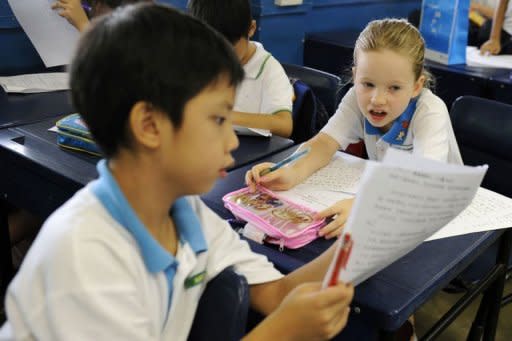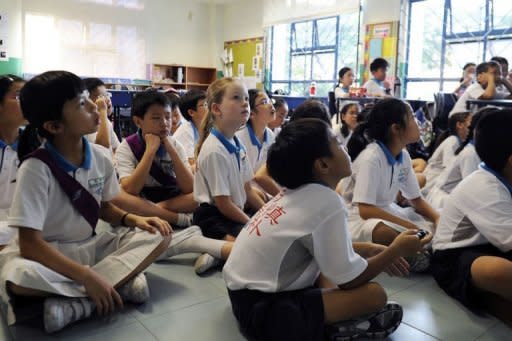Expats in Singapore arm children for Chinese century
As far back as 25 years ago, US investor Jim Rogers already believed China would be the next economic superpower and young people the world over should prepare for the future by learning Mandarin. Now 69, the billionaire had a chance to practise what he preached when he moved in 2007 to Singapore with his wife Paige Parker, 43, after visiting Hong Kong and Shanghai in search of an ideal place to bring up his children. Their daughters Happy, now nine, and Baby Bee, four, are studying in public schools in Singapore, which promotes mastery of Mandarin as part of its own ethnic Chinese heritage and, more pragmatically, to give its people economic opportunities. "Singapore has the best education in the world, the best healthcare, the best everything. I think that the best gift that I can give two children born in 2003 and 2008 is to know Asia and to speak Mandarin," Rogers told AFP. Rogers, who is also an author and financial commentator, is among the growing ranks of Western parents keen to prepare their children for the "Chinese Century". Singapore has been a major beneficiary, welcoming foreign professionals and investors attracted by its rapid economic progress and expatriate-friendly lifestyle. English is the main language of instruction in Singapore, a former British colony, but students in public schools are required to study a second language. Mandarin is mandatory for the ethnic Chinese majority and optional for the rest. A number of foreign parents who are not on expat packages cannot afford international schools in Singapore and have to send their children to local schools. But for a wealthy man like Rogers, who co-founded the Quantum Fund with legendary investor George Soros and now runs his own firm out of Singapore, sending his children to public schools is a matter of choice. He and his wife even hired a governess from China to make sure the girls continue speaking Mandarin at home. French expatriate Emmanuelle Bizard, 32, who moved to Singapore in August 2011, enrolled her four sons in local schools to help them integrate into Singapore society and take advantage of the low school fees. "Singapore welcomes us, so it is important for us to make an effort to meet Singaporeans and live a 'Singaporean experience'. It makes our experience more real," she said. Her only disappointment with local schools is their lack of feedback sessions for parents. "In France, we can see the teachers of our kids very easily, even every day if we want, so we have a lot of feedback. But here, we have marks and a feedback session every term," she added. Another criticism of local schools is the focus on rote learning and their highly competitive environment, but Rogers has no problem with it. "When they grow up, they have to compete with the Asians, and they should have the same demands, the same rigorous education that the Asians have, and that's why we are here," Rogers said. He believes critics of Asian education systems have not experienced them closely enough. "The US has been in decline for a few decades now as its education has deteriorated. Asia has risen in that time. The results speak for themselves." Singapore's public schools are renowned for producing students who excel in maths and science competitions, and other Asian countries consider the city-state's curriculum and teaching methods a benchmark to aim for. Singapore ranked seventh out of 100 participating countries at an annual mathematics competition for high school students held in Argentina in July. In the same month, the Singapore team clinched third position in a field of 28 countries at the International Young Physicists' Tournament in Germany. Despite the effusive praise from Rogers, not all expatriates are convinced of the Singapore way. There is also a growing clamour from Singaporean parents to reform the education system towards greater creativity, with less emphasis on rote learning and exam marks. American-born expatriate Rachel Kraut, 49, moved her four children from public schools to the German school in Singapore after several unpleasant encounters. "The main problem was many of the teachers' attitudes, and their teaching methods are fear-based," said Kraut, an associate professor at Nanyang Technological University's School of Biological Sciences, who is married to a German. She said her children worried about exams when on holiday and feared making mistakes because some teachers would humiliate students in class. Kraut said she was shocked when one of her daughters told her that she saw a boy being caned in class in fourth grade. "The idea was not to make learning fun and interesting, it was, 'if you don't do this, your future is ruined,'" Kraut said.




